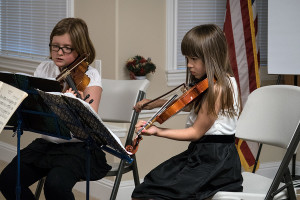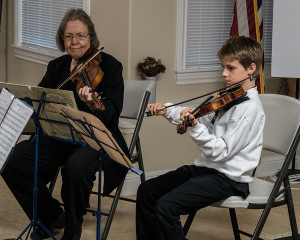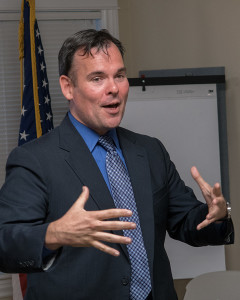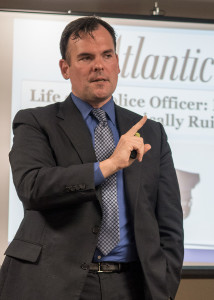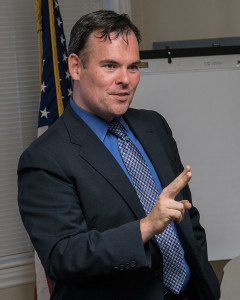Monday, April 27, 2015
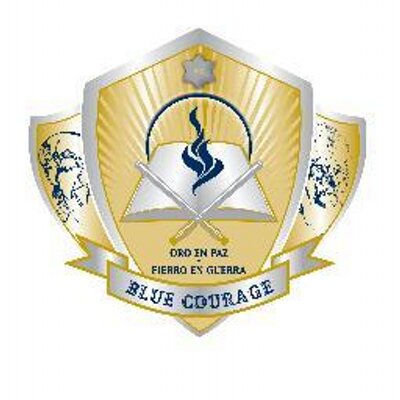
Lt. Jack Hart of the SFPD defies the stereotype of a police officer. He is intellectually curious, reflective, a good listener, and not shy about criticizing police officers, including himself. These are not characteristics one normally associates with cops. Hart is on a mission to help get policing right. He trains police officers in “Blue Courage,” a reform-minded program that seeks to instill (or rekindle) a commitment in cops to service, fairness, and accountability. In an impassioned, frank, and moving talk at SHARP, Hart gave us a taste of Blue Courage philosophy and training.
Hart discovered Blue Courage in the midst of what appeared to be a successful career as a police officer. He had been commended and promoted, yet he was dissatisfied with the job and thought about quitting. He was not alone. Police forces are plagued by low morale and high suicide and divorce rates. One researcher has found that brains of veteran police officers closely resemble those of prisoners of war. Hart said the life of a police officer is medically and psychologically ruinous.
In Hart’s view, cops are innocent, curious, and compassionate when they begin their careers but become cynical, arrogant, and callous, while pretending to be realistic, knowledgeable, and tough. Hart said cops tend to be anti-intellectual, quick to resort to violence, and discourteous—too busy judging to show empathy and compassion. Having ceased to believe in the cause of policing, they believe instead in the action of it.
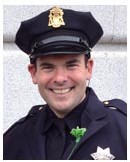
In speaking to the 2015 class of recruits at the SF Police Academy, Hart asked how many had had a bad encounter with the police. More than half said yes. Hart himself experienced one. After his car was stolen, he got a lecture from the responding police officer about what Hart had done wrong. Hart said police officers believe citizens will always be angry with them, so cops develop the attitude that the customer is always wrong. That’s just part of the problem. Hart said he cannot watch TV without seeing things cops do that make him sick. Among other incidents, he mentioned the racist text messages written by veteran SFPD officers; the asphyxiation by NYC police of African-American Earl Garner while he was gasping, “I can’t breathe;” a police officer in South Carolina repeatedly shooting an unarmed African-American man in the back as he fled after a traffic stop for a non-functioning brake light; and the death in Baltimore of a young African-American man, Freddie Gray, from a spinal cord injury suffered while he was in police custody.
In Hart’s view, police officers must relearn the moral courage that policing requires: the courage to be compassionate, to take responsibility, to do the right thing when no one is watching, to want to improve, and to speak up when fellow officers act badly. In Hart’s view such courage can be developed. Hart says it begins with an ideal, a proper sense of purpose, a “heart set” dedicated to service, justice, and fundamental fairness. Without that sense of purpose, an officer can’t develop the skills to be the public servant a police officer must be.
Hart showed an extraordinary clip from a TV news report about Elton Simmons, an LA County traffic cop who is so friendly and considerate when he writes tickets that he has gotten many commendations from the people he has cited and, incredibly, not a single written complaint. Elton Simmons may never have heard of Blue Courage, but he exemplifies it. Another such example is the cop in New York City who bought boots for a homeless person.
Hart acknowledged that it is not easy to develop such a compassionate approach to policing. Police officers have to be as tough as the situation requires yet as soft as possible. They have to be consistently excellent because their actions can dramatically affect a person for life and a community for generations. Citizens tend to forget police officers who act well and remember those who do not.
The evening was long on concept, anecdote, and aphorism but short on the mechanics of implementation. Hart frequently referred to a short book he uses in Blue Courage training: The Nobility of Policing, by Michael Nila (founder of Blue Courage) and Steven Covey, a famous motivational speaker. Hart did not explain in any detail how (or even whether) Blue Courage training produces a sustained commitment to Blue Courage policing. That’s OK. His passionate presentation kept the audience raptly attentive and produced enthusiastic applause at the end.
Blue Courage has been endorsed by the Department of Justice (scroll down to second page for a blurb on Blue Courage training) and the New York City Police Department, among many others. It is still a relatively new program. It remains to be seen whether it can actually change the hearts and minds of police officers and their superiors enough to make a significant difference in policing.
The cynicism of police officers is not the only problem facing police departments. New York Times columnist David Brooks, who is generally sympathetic to police, though somber in his assessment of their mental state, has argued that police unions have obstructed reform of police practices.
In February 2015, FBI Director James Comey gave an extraordinarily thoughtful 22-minute speech about (among other things) the challenges of policing, racial attitudes among police officers, racial disparities in arrests and incarceration, the FBI’s history of racial oppression, the lack of reliable data on police shootings, and the need for officers and citizens to better understand each other. The Five Thirty Eight blog has a good summary and analysis of the speech, but the speech itself is well worth listening to. One quote from it: “In the words of Dr. King, we must learn to live together as brothers or we will perish together as fools.”
Another quote: “In the absence of good data, all we get are ideological thunderbolts. What we need are ideological agnostics who use information to try to solve problems. . . .” U.C. Berkeley law professor Franklin Zimring recently wrote an article decrying the lack of reliable data about killings by police—a lack of data that Zimring called “a major scandal.”
——-
Before Hart’s talk on Blue Courage, we heard a brief crime report from Brian Donahoe and Jessica Zamora, two young police officers in the Taraval police district. The district (see map) is the city’s largest and includes the Inner Sunset west of 6th Avenue, as well as Golden Gate Heights. The officers said one can best avoid a car break-in by never leaving anything visible in one’s car, not even a jacket. Burglars tend to avoid homes with burglar alarms or large dogs. Home burglars typically hit the underwear drawer, closet, and the area under the bed; they typically don’t ransack the kitchen. Some calls to 911 go to the Highway Patrol, rather than the SFPD. To reach the SFPD with a 911 call, call (415) 533-8090. Put it on your speed dial. The officers offered statistics for various crimes in the Taraval district for April 2015 but had no figures for any period with which to compare them.
——–
The evening began with kids working hard: a mini-concert by The Musical Chairs. They are a group of beginner violinists in the third and fourth grades: Maya Espinosa, Dante Falzone, Tila Hooper, and Ava Kim. All belong to the Golden Gate Philharmonic Youth Orchestra. Ava couldn’t make it, so the group’s coach, Valerie Tisdel, took her place. The Musical Chairs performed several short pieces, including “Abide With Me” by William Monk; “Santa Lucia,” a Neapolitan boat song; “Aloha Oe,” by Queen Liliuokalani; and “Oh, Susanna!” by Stephen Foster. If you were there, you felt better about the world. Why? Because when kids work hard they inspire adults to do the same. Thank you, Musical Chairs!
